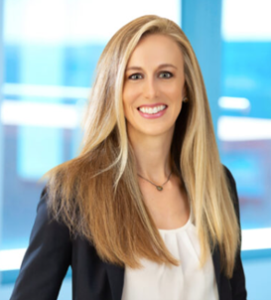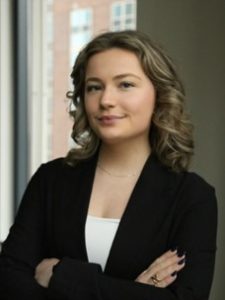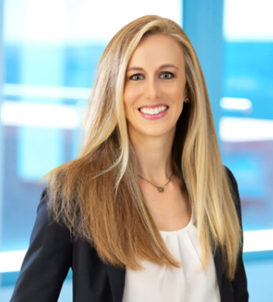
Amy Greywitt is an intellectual property attorney who began her career in science before finding her way to patent law. A Loyola University Chicago School of Law alum, she clerked for Judge Richard Linn of the U.S. Court of Appeals for the Federal Circuit and Judge Ronald Whyte of the Northern District of California. She has represented major corporations in complex IP litigation and now counsels start-ups on protecting and growing their intellectual property portfolios. Amy is also a yoga studio owner, balancing two careers she loves.
I sat down with Amy to talk about her path from molecular biology to law, how she built her IP practice, and why balance has become such an important theme in her life.
The following is an edited version of key highlights from our conversation. Bracketed text has been added to include additional context where helpful. Portions of Amy’s responses have been lightly paraphrased for clarity.
You started your career in molecular and cellular biology before pivoting to law school. What inspired the shift, or did you always know you wanted to go to law school after pursuing a STEM background?
I’ve always been interested in science and technology, but I didn’t know I wanted to go to law school. In undergrad, I took a bioethics class that completely changed how I thought about science—it got me interested in health law and policy. That class is what led me to Loyola, which has a really strong health law program.
When I applied and took the LSAT, I thought I was going into health law. Patent law wasn’t even on my radar yet. I went straight to law school after undergrad. I didn’t take any time off. And while I sometimes wish I had, it was nice to stay in the groove of studying and exams. Plus, graduating and starting my career early had its benefits.
While you were at Loyola, were there any experiences or mentors that shaped your career direction, or any extracurricular opportunities you would recommend?
Professor Cynthia Ho had a huge impact on my career. She invited me to attend the Richard Linn (IP) Inn of Court in Chicago as a student member, which allowed me to meet practicing attorneys every month. That experience really sparked my interest in patent law.
Professor Ho also encouraged me to apply for an IP scholarship during my 3L year. I received it and was invited to a dinner where I met Judge Richard Linn, who later invited me to apply for a Federal Circuit clerkship [a yearlong position working for a judge on patent and intellectual property appeals, helping research legal issues and draft opinions]. That opportunity and Professor Ho’s support completely changed my trajectory.
I was also involved in moot court, journal work, and took Loyola’s patent law legal writing class. [Moot court is a competition-based appellate advocacy program where students research, write briefs, and present oral arguments before panels of judges]. Those experiences were foundational. They built my research and writing skills, which became essential in practice. Loyola truly gave me the tools to succeed.
You started your career working on larger patent and antitrust litigation cases. What was that experience like?
My first job out of law school was at Fitzpatrick, Cella, Harper, & Scinto, a large patent litigation firm in New York. The work was fast-paced and intellectually challenging. I was constantly learning and doing legal research and writing, skills Loyola had really prepared me for.
It was an exciting time to start my career. I loved working on complex cases with smart, driven teams. After less than a year, though, I was offered a clerkship with Judge Linn at the Federal Circuit, so I left New York to clerk in D.C., which turned out to be one of the best decisions I’ve ever made.
How did your clerkships shape your perspective on IP law, and would you recommend clerking to students interested in this field?
Clerking was my favorite part of my career. At the Federal Circuit [the Federal Circuit is the US court of appeals that has exclusive jurisdiction over, among other things, all appeals in U.S. federal cases involving patents], I had the chance to see how patent law develops at the appellate level, how judges interpret claims and shape precedent. During my time there, we were seeing major Section 101 [patentable subject matter] cases like CLS Bank v. Alice and the BRCA gene patenting decision, so it was an especially exciting period.
My second clerkship was in the Northern District of California with Judge Ronald Whyte, where I saw litigation from the trial court perspective. Only about 20% of the docket was patent-related; the rest was a mix of employment, contract, and other federal cases. That clerkship taught me how trials actually run and how to think quickly across different areas of law.
For anyone considering clerking: go for it. Strong grades, solid writing skills, and prior judicial externships help. During one of my interviews, I had to write a legal analysis on the spot for the judge, so being comfortable with clear and concise writing really matters.
What led you from doing big law litigation to counseling start-ups, and what does that work involve?
After clerking, I joined Munger, Tolles & Olson, where I worked on large litigation matters and even went to trial. It was amazing experience, but after I had twins, the travel and long hours became tough. I decided to take a step back and, eventually, to start my own practice.
It was scary to leave such a great firm, but it turned out to be the best decision I’ve ever made. I started representing small businesses and local entrepreneurs in my community on IP counseling, trademarks, and some patent prosecution [drafting patents for approval through the United States Patent and Trademark Office]. The work came quickly. There’s a huge need for affordable IP support among small companies.
When the pandemic hit, I joined a former clerk friend who had started their own firm, Smith Baluch, where I still practice today. Now, I get to work with both start-ups and big tech clients like Intel and Google. It’s the perfect balance. I have colleagues and support, but I still control the kind of work I take on.
You also do trademark work. How did you get into that side of IP, and how is it different from your patent work?
When I first went out on my own, I realized that most of my litigation experience didn’t translate to solo practice. My small-business clients needed help with trademarks and I found I loved it.
Trademark prosecution is about brand strategy: helping clients protect their names and logos through registration with the U.S. Patent and Trademark Office. I enjoy guiding people to think about trademarks early rather than as an afterthought. It’s a creative, proactive process, and over time it became one of my favorite parts of my practice.
You also own yoga studios and are passionate about wellness. How has that part of your life influenced your approach to law and work-life balance?
When I was doing litigation, I was constantly working and started to feel like I was sacrificing my health. Yoga completely changed that. It helped me manage stress and find perspective.
After having my twins, I opened Metta Yoga Studios in my community while I was on maternity leave. It’s a lot to juggle, but it’s incredibly rewarding and uses a different part of my brain. Running a small business has also made me a better IP lawyer. I understand my clients’ challenges firsthand.
Do you have any closing advice for IP students at Loyola?
Enjoy your time in law school; it truly was one of the best times of my life. Take advantage of every opportunity: moot court, clinics, externships, and journals. [An externship is a position where law students work closely with a judge and their clerks to observe court proceedings, conduct legal research, and draft legal opinions]. Those experiences build confidence and open doors.
Work hard, but don’t forget about balance. The legal profession is evolving, and there’s room to create a career that fits your life. Get great experience early on, and when it’s time, shape your path in a way that makes you happy.

Adelyn Schmidt
Associate Blogger
Loyola University Chicago School of Law, J.D. 2027
